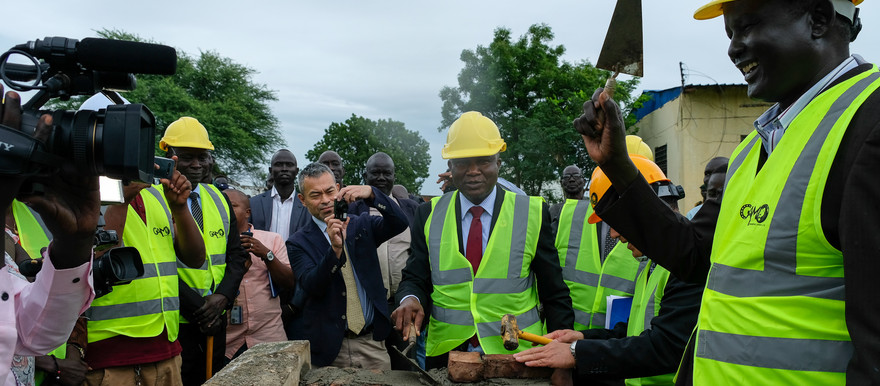Reconstruction works on Upper Nile University launched on Saturday, 29 June, during a ground-breaking ceremony in Malakal attended by a high-level delegation of government, academic, and UN officials.
The ceremony was presided over by the Minister of Higher Education, Yien Oral Lam, the Ambassador of Japan to South Sudan, Seiji Okada, UNDP Resident Representative Dr. Kamil Kamaluddeen, and Dr. Yoanes Edward A. Kugo, Deputy Vice Chancellor for Academic Affairs at Upper Nile University, pursuant the agreement signed in April to support the reconstruction of the Upper Nile University’s Malakal campus.
“Today our dreams are becoming reality, work is kicking off and we will continue to keep the momentum moving forward together until this job is done,” the Minister of Higher Education Yien Oral said during his remarks at the ceremony, adding his appreciation to the people and government of Japan and UNDP for their commitment to restore Upper Nile University.
Peter Chol Wal, the governor of Central Upper Nile, said the return of the university is a sign of life and a sign of prosperity returning back to Malakal town.
“The time is now for rebuilding and you have my assurances of the highest regard that the government of Central Upper Nile State will ensure the security of the rehabilitation works as well as maintain the peace in Malakal town,” he said.
Japan’s Ambassador to South Sudan Seiji Okada said they are very glad to support the reconstruction of Upper Nile University. “The return of 5,000 students and personnel will be the key, and we hope it offers local people job opportunities and will benefit people across the country. We hope to see reconstruction completed quickly and I hope to return to Malakal very soon with our dedicated partners for an inauguration of the campus,” said Okada.
The refurbishment work launched on Saturday will focus on key facilities of the main campus aimed at enabling students specializing in economics, human development, public health, and education to be able to relocate back to their home campus.
“Rebuilding Upper Nile University is not about restoring to a previous starting point, but about building back better. This university, and the wider Upper Nile region, must become places where people wish to return – not for physical structures – but for opportunities to pursue their dreams: to work, to earn a decent income, and to provide for their families. Part of the way that UNDP does business is to ensure and see to it that the local communities are benefiting. We want to put that multiplier effect in action here,” said UNDP Resident Representative Dr. Kamil Kamaluddeen, adding that the project will seek to use local materials and local labour to accomplish the reconstruction requirements.
Head of UNMISS Malakal Field Office Ms. Hazel Dewet emphasized the importance of bringing to bear humanitarian and development operations to Upper Nile. She highlighted that UNMISS supported more than 300 young people in vocational skills training applicable to the reconstruction works.
“We look forward to seeing a significantly large development of the community here and look forward to more opportunities to create an enabling environment for returnees to go back to their home communities,” said Ms. Dewet.




